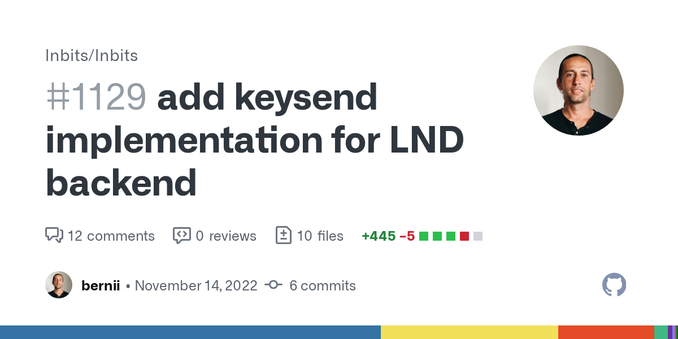| ⚡ | ericpp@getalby.com |
| LUD16 | ericpp@getalby.com |
Eric P
- 87 Followers
- 132 Following
- 889 Posts
@algrid There are some unintended consequences of doing it this way.
You could in theory send a bunch of 1 sat payments with a URL you want to DDoS in the comment field. That could be mitigated by requiring a minimum sat amount.
It would also deanonymize the IP address of the recipient. That could be mitigated by accessing the URL through Tor.
@francosolerio @dave @ChadF @podcastguru @sirtjthewrathful @adam
@heycitizen Many computer users run a modified version of the GNU system every day, without realizing it. Through a peculiar turn of events, the version of GNU which is widely used today is often called "Linux", and many of its users are not aware that it is basically the GNU system, developed by the GNU Project.
There really is a Linux, and these people are using it, but it is just a part of the system they use.
@ChadF There was a longstanding PR to add keysend support but it looks like finally they closed it without implementing it: https://github.com/lnbits/lnbits/pull/1129
They probably closed it since it got too far behind the code base. I wonder if they would accept a new PR.
@algrid @francosolerio @dave @podcastguru @sirtjthewrathful @adam
@dave Sorry, shot down probably isn't quite accurate. I think you all were happy with it as a solution in the board room, but the community had reservations over the Nostr part of it and it didn't get adopted.
I think the metaboost tag with a simple HTTP service is probably the way to go then. That lets you have whatever back end you want to store the data. But we need a common format and API to get data in and out. @algrid @ChadF @podcastguru @sirtjthewrathful @adam
@algrid That's the crux of it. There needs to be a publicly accessible service that accepts the metadata from the app and stores it for the user.
Helipad could expose an HTTP server, but most self-hosted nodes are behind home internet and NAT and not publicly accessible.
Nostr relays are public which makes them an easy solution. Custom HTTP services that store the data could work too as long as we agree on a common format and API.
